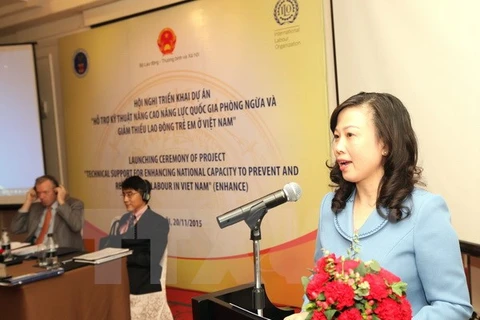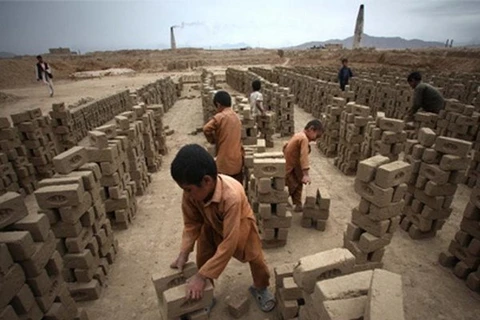 Child labour still exists in Vietnam, especially in the informal economic sector, despite significant efforts to combat the scourge (Source: zing.vn)
Child labour still exists in Vietnam, especially in the informal economic sector, despite significant efforts to combat the scourge (Source: zing.vn) Hanoi(VNA) - Child labour still exists in Vietnam, especially in the informal economic sector, despite significant efforts to combat the scourge, Deputy Minister of Labour, Invalids and Social Affairs Doan Mau Diep said in a workshop in Hanoi on June 14.
Speaking at the advocacy workshop on prevention and elimination of child labour in supply chains, which was held to mark World Day Against Child Labour, Deputy Minister Diep said that in recent years, Vietnam established a strong legal framework, aligned to a great extent with international labour standards, and implemented a number of programmes and projects to counter child labour nationally and locally.
But the latest National Child Labour Survey, launched in 2012, reported that 1.7 million children are still working, 34 percent of them for more than 42 hours a week.
Most of the children are aged 15 to 17.
The children are reported to be working in agriculture, construction, garments and restaurant services.
“Child labour has harmful effects on children’s health and psychological development, limits their school attendance and inhibits their transition to decent productive work,” he said.
Dang Hoa Nam, director of the Child Care and Protection Department under the Ministry of Labour, Invalids and Social Affairs, said that poverty was the main reason for child labour.
The poor access to social services, education, children protection services and vocational training was also to blame, he added.
The shortage of workers specialising in child care and protection was also a challenge, said Nam.
“As Vietnam is now deepening its global integration through free trade deals including the Trans-Pacific Partnership and EU-Vietnam Free Trade Agreement, the implementation of international commitments on labour, including child labour in supply chains, will receive more attention,” said Nam.
Director of the International Labour Organisation (ILO) in Vietnam, Lee Chang-hee, said children are often highly vulnerable because parents’ incomes are insufficient or because informal family enterprises cannot afford to hire adult workers to replace the unpaid work of their children.
According to the ILO, the fight against child labour requires coherent policy packages to back child labour legislation – quality education, social protection and decent jobs for parents.
Deputy Minister Diep said that law enforcement and the proactive participation of families, community, State agencies, enterprises, trade unions and social organisations play an important role.
“The active, responsible participation of all social partners will help better enforcement of laws and policies against child labour, and contribute to the implementation of children’s rights and the future of the country’s workforce,” he said.
Director Nam said that on June 7 the Prime Minister approved the National Programme of Action on Prevention and Elimination of Child Labour for the years 2016-20, demonstrating Party and State determination to strive for a better future for the children.
The programme will include education to raise community awareness of the ills of child labour, and inspectors and social workers, especially at the commune level, would receive more incentives to reduce child labour.-VNA























